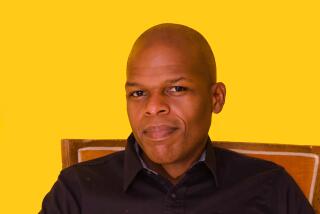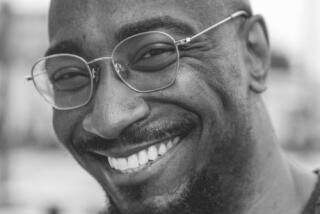‘Eddie Signwriter: A Novel’ by Adam Schwartzman
Eddie Signwriter
A Novel
Adam Schwartzman
Pantheon: 296 pp., $25.95
The first pages of “Great Expectations” find Pip flipped upside-down by his ankles, a sign of the turns and tumult to come: He will fall head-over-heels in love; he will become a gentleman thanks to the sponsorship of a criminal; throughout, he will see his expectations both exceeded and defeated.
“Eddie Signwriter,” the first work of fiction by South African poet Adam Schwartzman, operates within this tradition of novelistic gymnastics. After a somersault in utero sends Eddie out feet first, he faces reversals as bewildering as Pip’s. Born in Ghana, Eddie spends part of his childhood in Botswana, where his father works. A disorienting move back home permits him to meet Celeste, who initially seems the love of his life but turns out to be merely the love of his youth. Once Celeste’s aunt dies inexplicably -- her body caught upside-down in a river -- the village unjustly holds Eddie responsible and banishes him. In the ensuing years, cataclysm and wanderlust will send Eddie from Ghana throughout Africa until he lands in Paris, having defined himself professionally as a sign painter but otherwise still seeking to discover, or rather to invent, who he is. Each twist in this ambitious, accomplished novel plays with the trickery of resolution: the evanescent often resurfaces, while the seemingly permanent vanishes without warning.
“Eddie Signwriter” is a book of fleeting hours. Nostalgic scenes of blossoming love between Eddie and Celeste hearken to the brief, sun-spangled summers of Nabokov’s “Ada,” where another forbidden affair took root; they also recall Hawthorne’s dim forest in “The Scarlet Letter,” whose clandestine companions linger for “another, and another, and, after all, another moment.”
Themes and scenes from multiple other works poke through the lattice of Schwartzman’s prose, including the Book of Genesis itself. Eddie and Celeste fall in love in a garden, and years later, he finds paradise in a friendly Parisian plant store, “a garden of flowers . . . risen up against the city.” In exile, Eddie travels thousands of miles only to locate another Eden, to rediscover what had seemed irrecoverable. Resonating with allusions, this book features literary rediscovery too.
If “Eddie Signwriter” is about the struggle to recover from the flip-flops of fate, it’s also about the problem of recovering oneself, about remaining who one is in a world prone to terrifying transformation. Eddie’s childhood return to Ghana leaves him feeling “disconnected from himself.” Years later, zipping across Africa en route to Paris, Eddie notes that his fellow train passengers must battle “to remain themselves.” Perhaps the complexities -- even impossibilities -- of maintaining a stable self explain why Eddie possesses so many names. Born Kwasi Edward Michael Dankwah, he often goes by Eddie and dubs himself Signwriter once he opens his business. “Kwasi” might pun on “quasi,” as if to suggest Eddie is neither quite one thing nor another. His name, a bouquet plucked from various countries and cultures, draws attention to his internationalism, but no particular nation overwhelms the bunch; Eddie seems person first, Ghanaian second. In his poetry, Schwartzman -- himself a Jewish South African who has lived in England and now Turkey -- handles history and nation the way adolescents handle parents: Sometimes he frets over them, and sometimes he shrugs them off. Perhaps Eddie’s several names suggest such flexibility -- he may claim multiple versions of himself, only some of which bear the marks of his birthplace.
Alternative interpretations prove central not only for Eddie but also for “Eddie” more generally. The book begins with a communal misreading, or rewriting, of the villager’s drowning. In another echo of Hawthorne, townspeople whisper and wonder until, through words alone, they craft “a platform so complete and strong as to constitute knowledge” of Eddie’s guilt. As a sign painter, Eddie likewise reinvents his world in a way that permits him to know it. Through sketching friends and family into his signs, he comes to trust in their reality: “Unless in some form he made [things] again,” Schwartzman writes, “he couldn’t believe they were there.” (Schwartzman, similarly, remakes himself in Eddie, who re-creates characters the author has already portrayed in the novel.)
The practice of “making things again” becomes key to Eddie’s relationships, which, like doilies, are as notable for their gaps as for the work that holds them together. Eddie participates in paradoxical communities, often connecting through disconnection. In Paris, he finds an expatriate circle whose members belong with each other because they belong nowhere. After the group dissolves, his new lover -- herself, in a sense, a remaking of Celeste -- urges him to “make it again”: to flip the fallen world back on its feet; to claim, like Hawthorne’s lovers, yet another moment -- even in the shadow, and promise, of momentous loss.
Deutsch is a writer in New York. Her work appears in the Village Voice, Bookforum, n+1, Poetry and other publications.
More to Read
The biggest entertainment stories
Get our big stories about Hollywood, film, television, music, arts, culture and more right in your inbox as soon as they publish.
You may occasionally receive promotional content from the Los Angeles Times.






